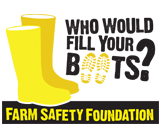As the UK and Ireland’s annual Farm Safety Week campaign begins, the charity behind it reveals some alarming research about why farms are the most dangerous place to work
- New figures released today show that farming continues to have the poorest safety record of any occupation
- Fatal injuries on GB farms continue to remain stubbornly high – 23 farm worker deaths were recorded in 2023/24
- Four members of the public, including two children, were also fatally injured bringing the total to 27 people that lost their lives on farms in GB in 2023/24
- It’s a similar picture in Northern Ireland where farming accounted for 8 of the 17 (47%) reported workplace fatalities in 2023/2024 (HSENI)
- Farm Safety Week 2024 aims to reduce the number of incidents which continue to give farming the poorest safety record of any occupation in the UK
Monday 22nd July 2024– New figures released today show that farming continues to have the poorest safety record of any occupation in GB with 27 people losing their lives on farms in 2023/24.
In a sector that accounts for one per cent of the working population, agriculture accounts for 20 per cent of all deaths in the workplace. The figures, released today by the Health & Safety Executive (HSE) showed that, while the total number of people losing their lives on GB farms remained the same as the previous year, there was an increase in the number of farm workers killed in the workplace in 2023/24. A figure of 23, up from the 21 recorded in 2022/23. Nearly 40% of which were over the age of 65 years.
The picture is similar in Northern Ireland where farming accounted for 8 of the 17 (47%) reported workplace fatalities in 2023/2024 (HSENI).
The Farm Safety Foundation (Yellow Wellies), the charity behind the annual Farm Safety Week campaign believes that, in addition to the numbers of lives lost on farms every year, the industry needs to address the attitude to risk-taking and poor safety behaviours that result in an additional 23,000 injuries to workers every year in GB alone.
According to NFU Mutual, there were a total of 937 farm accident claims recorded in the UK for 2023/24, an encouraging decrease on the figure of 1,021 in 2022/23.
Causes of the accidents included falls from height, trapped body parts and falling objects, all of which cost the rural insurer over £68 million.
But what is leading to those accidents?
Research carried out by the charity in September 2023 revealed that 88% of farmers in the UK believe that ‘complacency’ – always having it done that way – is a major contributor to having a farm accident while 82% cite’ attitude’ as the major contributor.
Stephanie Berkeley, Farm Safety Foundation manager explains: “Farm safety is not just our problem, it’s a worldwide problem.
“According to the International Labour Office (ILO) agriculture employs half of the world’s labour force but remains one of the three most hazardous sectors of activity (along with construction and mining). The UK recorded a total of 35 farm-related deaths over the past year including two children. 35 families and communities devastated by the loss of a loved one. We can’t let this continue.
2024 marks the 10th anniversary of the Farm Safety Foundation and those ten years have passed quickly. While we are proud of what we have achieved, looking at HSENI and NFU Mutual’s figures, there is so much more to be done to address the risks and dangers farm workers face every day to put food on our plates.
This year’s Farm Safety Week offers an opportunity for a real reset of the way we approach farm safety and risk-taking. We can not continue to tolerate poor safety behaviours, we can not assume that its somebody else’s job to drive this change in culture, and we can not rely on luck when going about our daily tasks.”
According to farm safety expert and recipient of the Lantra Wales Lifetime Achievement Award, Abbeycwmhir farmer Brian Rees; “As we arrive at another Farm Safety Week, we think about the dozens of fatal accidents we have in our industry, the hundreds of life changing injuries and the thousands of near-misses that get laughed off without any further thought.
So, this week I would ask everyone to action three points; if it’s faulty or broke ‘FIX IT’. If it’s dangerous or unsafe ‘LEAVE IT’ and if you have a near-miss think about it and ask yourself the question ‘WHAT IF…’”
Sue Thompson, Head of Agriculture, Health & Safety Executive (HSE) added: “This year’s fatality figures for agriculture once again make for disappointing reading. The number of deaths remains high, with the fatality rate yet again the highest of the major industry sectors.”
“It is fantastic to see Farm Safety Week shine a light on both the safety and health issues that affect farmers. As well as fatalities, many more farmers suffer serious injury and life changing illness. Farmers must put the safety and health of themselves and others at the heart of the incredibly important work that they do.”
“We will certainly play our part as a regulator, through targeted visits to farms and holding the industry to account when health and safety standards are not met. But the reality is that the industry itself has to bring about a change in its culture. That is the only way to drive meaningful and lasting health and safety changes.”
“The industry understands that the farm workplace can be dangerous, and yet still children are allowed into it. Children must be much better protected by the farming community. It really comes down to a choice, a choice for farmers and farming: to keep the culture that it currently has, or to keep children safe. It can’t do both.
“Farmers are rightly proud of a reputation of being able to fix anything on the farm; machinery, fencing, equipment, anything. The challenge now is whether farmers can fix the industry’s broken health and safety record.”
For more information on Farm Safety Week visit www.yellowwellies.org or follow @yellowwelliesUK on Instagram/Facebook/X using the hashtag #FarmSafetyWeek

| [donate]
| Help keep news FREE for our readersSupporting your local community newspaper/online news outlet is crucial now more than ever. If you believe in independent journalism,then consider making a valuable contribution by making a one-time or monthly donation. We operate in rural areas where providing unbiased news can be challenging. |


















